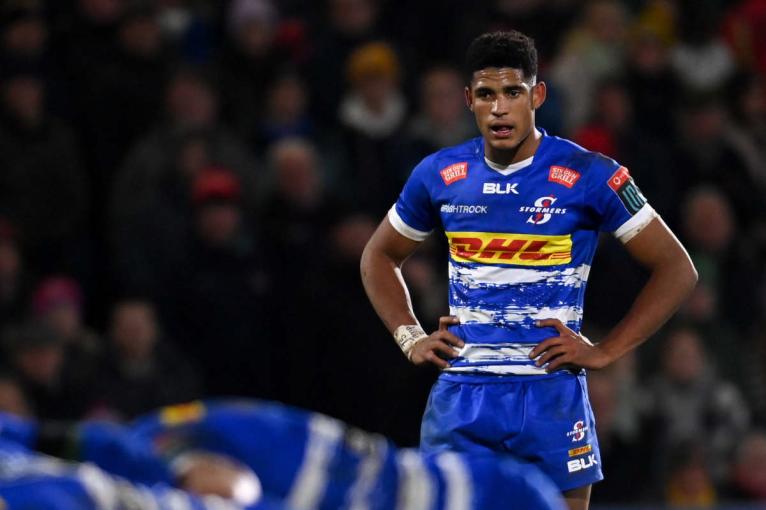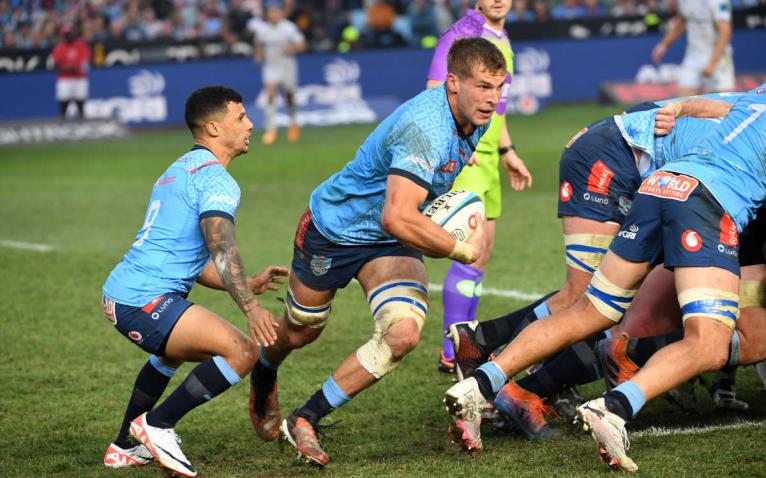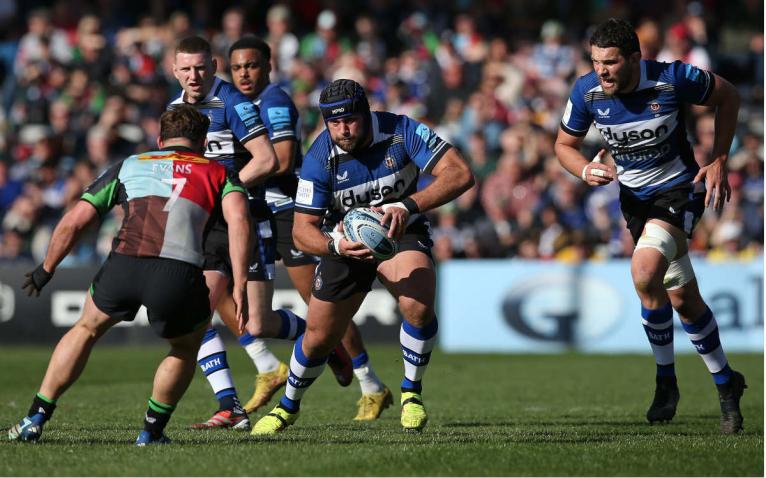Rassie Erasmus has already stated that the Springboks are looking ahead to the 2027 World Cup – and ultimately the opportunity to win a third-consecutive Webb Ellis Cup.
That overriding ambition could have a negative impact on their overall win-rate in 2024, 2025 and 2026, as Erasmus ushers in the next generation and builds a more balanced squad capable of peaking at the global showpiece in Australia.
The first squad of the new season boasts a youthful and inexperienced flavour, with Erasmus including 12 uncapped players in the initial group of 35. A few more uncapped players may join the group in the coming weeks, when fitness and availability permits. There’s another band of young players in the current squad who didn’t travel to last year’s World Cup. Each of these players has accumulated 10 caps or fewer.
Then there are the more experienced specialists who have been in the squad for a substantial period, but have been used sparingly (more on this in a moment, but Bath star Thomas du Toit headlines this group). The usual suspects who starred in 2019 and 2023 will have key roles to play in the upcoming two-match epic against Ireland, and in the big matches of the Rugby Championship.
The season-opener against Wales, the one-off against Portugal on 20 July, and the end-of-year tour to the United Kingdom should provide Erasmus with an extensive opportunity to look at the following group of players.
BACK THREE
Damian Willemse has been ruled out of the mid-year Tests, while it remains to be seen how much Kurt-Lee Arendse and Canan Moodie – who both underwent surgery recently – will feature. Cheslin Kolbe, one of South Africa’s star players, could miss out due to a knee niggle. Bulls and Bok kingpin Willie le Roux won’t be available for the clash against Wales at Twickenham.
Makazole Mapimpi have served the team well over the past two seasons, albeit in a second-choice capacity. In the coming Tests, the experienced winger may be recalled to complement the selection of one or two less experienced players.
Edwill van der Merwe (28) is one of the biggest bolters in the current squad, having not been invited to the previous alignment camps.
The mini-crisis in the Bok back three has necessitated his elevation, and the Lions winger may well find himself thrust into the starting XV sooner rather than later. While not as compact as Kolbe or Arendse, Van der Merwe boast similar speed and agility, and may suit the Boks’ counter-attacking approach.

Lions fullback Quan Horn (22) will provide cover for the back three, and it will be interesting to see whether he gets game time at Twickenham now that Le Roux has been ruled out.
It wasn’t too long ago when Aphelele Fassi (26) was hailed as the next big thing in South African rugby. The Sharks fullback made just three appearances (on the wing) for the Boks across the 2021 and 2022 seasons, before the coaches decided to move in a different direction.
While the Sharks have fired in patches over the past two seasons, Fassi has been one of his most consistent performers. In the recent Challenge Cup playoffs, it was clear how much work the player had done to improve his kicking and aerial game. On attack, ‘The Weekend Special’ has been as potent as ever.
MIDFIELD
Ethan Hooker (21) starred for the Junior Boks in last year’s World Rugby U20 Championship, and was subsequently backed for a regular role at the Sharks.
A series of physical performances in the midfield have caught the eye of the Bok coaches, who have decided that the time is right to bring the youngster into the senior squad. This selection may have been made with a view to the long term, as the Boks certainly aren’t short on experienced centre options at present.
Damian de Allende and Lukhanyo Am manned the midfield at the 2019 World Cup and in the 2021 series against the British and Irish Lions, while Jesse Kriel filled in for the injured Am at the 2023 World Cup.
André Esterhuizen has battled for game time behind those aforementioned players, and will be desperate for more opportunities in the coming months.
⚡️ ETHAN HOOKER!!!!#URC #SHAvULS pic.twitter.com/XnoeVDtKXj
— Jared Wright (@jaredwright17) March 23, 2024
All of those players are in their early 30s, and there’s no guarantee that they will all progress to the 2027 World Cup. With Am currently recovering from a shoulder injury, there is slightly more room to explore an alternative at No 12 and 13 in the coming months.
Moodie, who is the same age as Hooker and has played outside centre as well as wing for the Boks since 2022, will provide another exciting midfield option once he recovers from a finger injury.
FLY-HALF
Fly-half has been the big talking point in the lead-up to mid-year Tests, given that Handré Pollard was never going to be available for the opener against Wales, and that the Boks have lost three experienced No 10 options – Elton Jantjies, Morné Steyn and Frans Steyn – in recent years.
With the Stormers bowing out of the United Rugby Championship playoffs, Manie Libbok is available for selection. It’s hardly a conservative option, given that Libbok is only 26 and has been part of the national set-up for less than two years. Libbok as well as Pollard (30) could go to the next World Cup. Nevertheless, Erasmus would do well to invest in a few other options while he can.
Sacha Feinberg-Mngomezulu (22) has emerged as one of South African rugby’s most exciting new players.
The former Junior Boks captain was drafted into the Stormers team for the 2022 URC playoffs. He travelled with the senior team on the subsequent tour to Europe, and started at flyhalf for South Africa A in the midweek match against the Bristol Bears.
Injuries have curtailed his involvement with the Stormers in recent seasons. In the most recent campaign, he produced several outstanding cameos. While flyhalf is his preferred position – and he offers an excellent goal-kicking option – he has also contributed at inside centre and fullback.
Unsurprisingly, his natural ability as well as his mature approach has drawn comparisons to another prominent Bok and Stormers utility player, and earned him the nickname ‘Little Damian’.

Many in South African circles believe that he may surpass Willemse, and become the first-choice fly-half once Pollard retires. For now, Feinberg-Mngomezulu’s versatility could prove an asset to the Bok matchday 23, as Erasmus loves a back who can cover multiple positions on the bench.
Jordan Hendrikse (22) has played flyhalf and inside centre for the Lions, and the physicality he brings to those positions would have impressed the national coaches. It remains to be seen when he will join Jaden at the Sharks next season, and whether the Hendrikse brothers will take that halfback partnership to the next level.
Siya Masuku (27) may seem like an outside bet at this point. He’s not as young as the other flyhalves on this list, and it would come as a surprise to see him picked as a utility back on a six-two bench.
But like Libbok, Masuku has shouldered the responsibility as the first-choice flyhalf at his franchise during the business end of the club season. Unlike Libbok, he has steered his team to a Challenge Cup title, and earned the Sharks a place at the Champions Cup table.
At some point, Erasmus may have to give him a start – possibly against Portugal – although it will be interesting to see whether he receives that opportunity ahead of other promising newcomers like Feinberg-Mngomezulu, who at the very least could travel to the next World Cup as a utility player.
SCRUM-HALF
A number of South African fans expressed their surprise when Lions utility back Sanele Nohamba (25) was omitted from the initial group of 35.
Nohamba featured for the South Africa A team in the 2021 British and Irish Lions series, and a year later in midweek matches against Munster and Bristol. While he is better known for his exploits at scrum-half, he has been given more responsibility at the Lions as the first-choice flyhalf and goal-kicker.
A player with ability to cover scrum-half and fly-half, and nail important kicks, would be an asset to the Bok side, particularly on the bench. Erasmus recently confirmed that Nohamba is on the national radar, and may come into the squad later in the season.
Lions break through and Morné van den Berg extends the hosts’ lead further 🏉
Lions 35-17 Dragons
📺 Live on @BBCTwo Wales#BBCRugby pic.twitter.com/rJYnNyoqC6
— BBC ScrumV (@BBCScrumV) December 2, 2023
For now, Erasmus has settled for another exciting Lions scrum-half. Morné van den Berg (26) is the mould of Cobus Reinach, a fiery and physical No 9 with the speed of an outside back. Faf de Klerk is available for the start of the season, and the scrum-half group may be bolstered by Reinach’s return in the coming weeks.
The Bok coaches may look to give Grant Williams (27) more game time in the coming months. Jaden Hendrikse (24) has only been on the Test scene for two years, and should also receive more chances once he returns from a shoulder injury.
BACK ROW
Another former Junior Bok skipper, Phepsi Buthelezi (25) has played much of his rugby at No 8 and blindside flank.
On the 2022 tour to Europe, however, he was used as an openside flank in both matches for South Africa A. He is highly rated as a player and as leader, and some among the Bok management believe that he may be a candidate for the Test captaincy down the line.
Siya Kolisi had initially planned to retire from international rugby after the 2023 World Cup. While he reversed the decision ahead of the 2024 season, he is unlikely to retain the captaincy on a permanent basis, and already Erasmus is assessing short- and long-term candidates.
The Boks have a few options at openside flank, but are certainly not spoiled for long-term choices. Deon Fourie (37) has been ruled out for the rest of the season, and could play a limited role in future.
Kolisi (32) and Kwagga Smith (31) remain outstanding options in the short term, while Marco van Staden (28) should take on more responsibility in the coming years.

While some of the Bok loose forwards may push on to 2027, it’s highly unlikely that all of those stalwarts will be selected for the tilt at a third-consecutive title. Cameron Hanekom (22) is another exciting player who may be backed sooner rather than later, given his recent success in the URC as well as the No 8 situation at the Boks.
Duane Vermeulen has retired, while Jasper Wiese, who was handed a lengthy suspension for a reckless tackle in a Premiership match, will play no part in the mid-year Tests.
Evan Roos (24) was particularly impressive in the big win against England at Twickenham two years ago. There’s a lot of hype around Hanekom in South African circles, but Roos is a relative youngster, and with only a handful of Test caps to his name he will be desperate for another chance to prove himself.
Elrigh Louw (24) is another younger player who enjoyed a brief taste of Test rugby in 2022. It would appear that the Bok coaches are more interested in another Bulls loose forward, however, as the powerful yet athletic Mpilo Gumede(23) cracked an invite to the national camp ahead of the Wales Test.
SECOND ROW
Ageing warriors such as Eben Etzebeth, Lood de Jager and Franco Mostert may not be around in 2027, but RG Snyman (29) could play a more central role if he remains fit.
Salmaan Moerat (26), who led South Africa at age-group level and currently captains the Stormers, should also receive more game time. If not for a serious leg injury, Moerat may have featured in the 2023 World Cup squad.
Erasmus loves a utility forward, and while Pieter-Steph du Toit remains a generational athlete, a few other players have made a statement regarding their versatility in recent months.
Ben-Jason Dixon (26) has contributed at flank and lock for the Stormers, and his hard edge and work ethic make him a potentially good fit for the Boks. De Jager and Jean Kleyn’s injuries have left the Boks light on second-row options, particularly for the first Test against Wales.
Bulls lock Ruan Nortjie, who won a Test cap back in 2022, and has taken his ball-carrying and lineout game to new heights this season, will only become available after the URC final.
FRONT ROW
One of the keys to the Boks’ sustained success at the scrum, lineout and maul over the past six years has been their front-row depth. The fact that Wilco Louw has played only a handful of games for South Africa during this period speaks to the quality of the props in the pecking order.
Like Louw, Thomas du Toit has been in the senior national system since 2017, when he first represented South Africa A. In the ensuing six years, the versatile prop has accumulated fewer than 20 Test caps. The quality of these ‘fringe’ players needs to be kept in mindwhen assessing the younger players pushing for a place in the match day squad, and possibly even for a start.
Gerhard Steenekamp (27) got his first shot in a friendly against Argentina last year, while Ntuthuko Mchunu (25) won a Test cap in 2022. These loosehead props are still at the beginning of their respective international journeys, and may go on to complement Ox Nché, Du Toit, and Steven Kitshoff, who is currently nursing an injury.

The’ tighthead group is ageing, and it’s unlikely that Frans Malherbe (33), Vincent Koch (34) and Trevor Nyakane (35) will all press on to the 2027 World Cup.
Du Toit (29) and Louw (29) may well receive more game time in this four-year cycle. Neethling Fouché has been playing behind Malherbe at the Stormers for the past few years, and while the 31-year-old is certainly no youngster, he may bring a new edge to the Boks’ set piece if given the chance, possibly against Portugal.
Malcolm Marx and Bongi Mbonambi are among the best hookers in the world, and the latter is one of the leaders in the team. Mbonambi (33) is nearing the end of his Test career, though, and the Boks have to take action now if they’re going to develop three or more world-class options ahead of the next global tournament.
André-Hugo Venter (22) has been on the radar for some time. He played for the South Africa A side in 2022, and was elevated to the senior squad earlier this season.
If he doesn’t play against Wales, he will certainly feature against Portugal. Indeed, if there are injuries to the frontline hookers over the next few weeks, Venter may find himself packing down against Ireland in Pretoria and Durban this July. That said, Erasmus may revisit the more experienced option of Joseph Dweba (28), who plays ahead of Venter at the Stormers, and has been included in the squad for the mid-year Tests.
Johan Grobbelaar (26) is another long-term project. The Bulls hooker has been involved with the Boks at previous training camps, but is yet to win a Test cap. Following his stellar contributions in this year’s URC, and given the Boks’ quest to bolster their depth in this department, he is likely to get a run at some point over the course of the 2024 season. The team that won the 2019 and 2023 World Cup titles was known and celebrated for its experience. And yet, development has been one of Erasmus’s priorities over the past six years.
Johan Grobbelaar try for Bulls vs Stormers #BULvSTO #BKTURC #URC #SinBinRugby #iamastormer #dhldelivers #BackTheBulls pic.twitter.com/hrwM7yIjOG
— Sin Bin Rugby. (@sin_bin_rugby) March 2, 2024
Closer analysis shows that more than 100 players worked with the Boks across various games and training camps during that period. Erasmus and Jacques Nienaber rotated their squads to ensure that the younger players – and in some cases, the fringe players – received game time in-between World Cups. The strategy cost the Boks some results, and certainly hurt their overall win-record.
However, by the time the team arrived at the World Cup in Japan, and subsequently in France, the coaches were in a position to make educated decisions regarding individual selections and strike the necessary balance between youth and experience.
Erasmus has already said that the team that travels to Australia in 2027 will look very different to the squads that featured in 2019 and 2023. Don’t be surprised if many of the players listed above power South Africa’s drive for a potential hat-trick of World Cup titles.


“Erasmus and Jacques Nienaber rotated their squads to ensure that the younger players – and in some cases, the fringe players – received game time in-between World Cups. The strategy cost the Boks some results, and certainly hurt their overall win-record.
However, by the time the team arrived at the World Cup in Japan, and subsequently in France, the coaches were in a position to make educated decisions regarding individual selections and strike the necessary balance between youth and experience.”
Erasmus and Nienaber rotated players into their squad, realised the young players weren’t very good so didn’t cap them, and then made the educated decision to skew world cup selection heavily in favour of old players.
If Erasmus and Nienaber use the mid-year tests to cap a number of young players that will be a serious deviation from previous selection policy.
Here we go again, the resident expert on Springbok development having another swing and a miss. Seems to me you have all the answers all the time yet fail to mention even 1 player who has been left out by the Springboks’ development plans the past 4 years.